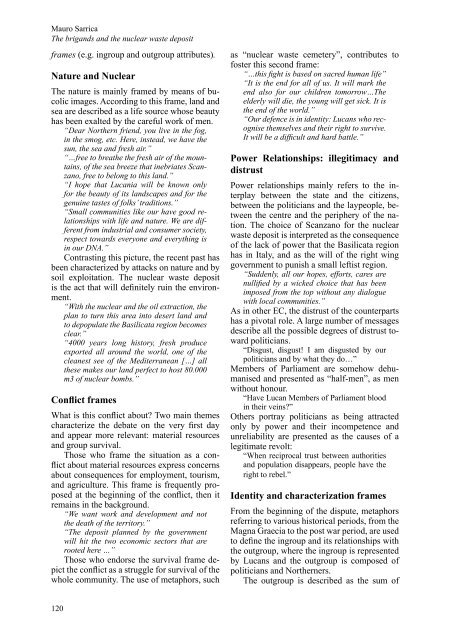State, community, individual - Societal and Political Psychology ...
State, community, individual - Societal and Political Psychology ...
State, community, individual - Societal and Political Psychology ...
Create successful ePaper yourself
Turn your PDF publications into a flip-book with our unique Google optimized e-Paper software.
Mauro Sarrica<br />
The brig<strong>and</strong>s <strong>and</strong> the nuclear waste deposit<br />
frames (e.g. ingroup <strong>and</strong> outgroup attributes).<br />
Nature <strong>and</strong> Nuclear<br />
The nature is mainly framed by means of bucolic<br />
images. According to this frame, l<strong>and</strong> <strong>and</strong><br />
sea are described as a life source whose beauty<br />
has been exalted by the careful work of men.<br />
“Dear Northern friend, you live in the fog,<br />
in the smog, etc. Here, instead, we have the<br />
sun, the sea <strong>and</strong> fresh air.”<br />
“…free to breathe the fresh air of the mountains,<br />
of the sea breeze that inebriates Scanzano,<br />
free to belong to this l<strong>and</strong>.”<br />
“I hope that Lucania will be known only<br />
for the beauty of its l<strong>and</strong>scapes <strong>and</strong> for the<br />
genuine tastes of folks’ traditions.”<br />
“Small communities like our have good relationships<br />
with life <strong>and</strong> nature. We are different<br />
from industrial <strong>and</strong> consumer society,<br />
respect towards everyone <strong>and</strong> everything is<br />
in our DNA.”<br />
Contrasting this picture, the recent past has<br />
been characterized by attacks on nature <strong>and</strong> by<br />
soil exploitation. The nuclear waste deposit<br />
is the act that will defi nitely ruin the environment.<br />
“With the nuclear <strong>and</strong> the oil extraction, the<br />
plan to turn this area into desert l<strong>and</strong> <strong>and</strong><br />
to depopulate the Basilicata region becomes<br />
clear.”<br />
“4000 years long history, fresh produce<br />
exported all around the world, one of the<br />
cleanest see of the Mediterranean […] all<br />
these makes our l<strong>and</strong> perfect to host 80.000<br />
m3 of nuclear bombs.”<br />
Confl ict frames<br />
What is this confl ict about? Two main themes<br />
characterize the debate on the very fi rst day<br />
<strong>and</strong> appear more relevant: material resources<br />
<strong>and</strong> group survival.<br />
Those who frame the situation as a confl<br />
ict about material resources express concerns<br />
about consequences for employment, tourism,<br />
<strong>and</strong> agriculture. This frame is frequently proposed<br />
at the beginning of the confl ict, then it<br />
remains in the background.<br />
“We want work <strong>and</strong> development <strong>and</strong> not<br />
the death of the territory.”<br />
“The deposit planned by the government<br />
will hit the two economic sectors that are<br />
rooted here …”<br />
Those who endorse the survival frame depict<br />
the confl ict as a struggle for survival of the<br />
whole <strong>community</strong>. The use of metaphors, such<br />
120<br />
as “nuclear waste cemetery”, contributes to<br />
foster this second frame:<br />
“…this fi ght is based on sacred human life”<br />
“It is the end for all of us. It will mark the<br />
end also for our children tomorrow…The<br />
elderly will die, the young will get sick. It is<br />
the end of the world.”<br />
“Our defence is in identity: Lucans who recognise<br />
themselves <strong>and</strong> their right to survive.<br />
It will be a diffi cult <strong>and</strong> hard battle.”<br />
Power Relationships: illegitimacy <strong>and</strong><br />
distrust<br />
Power relationships mainly refers to the interplay<br />
between the state <strong>and</strong> the citizens,<br />
between the politicians <strong>and</strong> the laypeople, between<br />
the centre <strong>and</strong> the periphery of the nation.<br />
The choice of Scanzano for the nuclear<br />
waste deposit is interpreted as the consequence<br />
of the lack of power that the Basilicata region<br />
has in Italy, <strong>and</strong> as the will of the right wing<br />
government to punish a small leftist region.<br />
“Suddenly, all our hopes, efforts, cares are<br />
nullifi ed by a wicked choice that has been<br />
imposed from the top without any dialogue<br />
with local communities.”<br />
As in other EC, the distrust of the counterparts<br />
has a pivotal role. A large number of messages<br />
describe all the possible degrees of distrust toward<br />
politicians.<br />
“Disgust, disgust! I am disgusted by our<br />
politicians <strong>and</strong> by what they do…”<br />
Members of Parliament are somehow dehumanised<br />
<strong>and</strong> presented as “half-men”, as men<br />
without honour.<br />
“Have Lucan Members of Parliament blood<br />
in their veins?”<br />
Others portray politicians as being attracted<br />
only by power <strong>and</strong> their incompetence <strong>and</strong><br />
unreliability are presented as the causes of a<br />
legitimate revolt:<br />
“When reciprocal trust between authorities<br />
<strong>and</strong> population disappears, people have the<br />
right to rebel.”<br />
Identity <strong>and</strong> characterization frames<br />
From the beginning of the dispute, metaphors<br />
referring to various historical periods, from the<br />
Magna Graecia to the post war period, are used<br />
to defi ne the ingroup <strong>and</strong> its relationships with<br />
the outgroup, where the ingroup is represented<br />
by Lucans <strong>and</strong> the outgroup is composed of<br />
politicians <strong>and</strong> Northerners.<br />
The outgroup is described as the sum of


